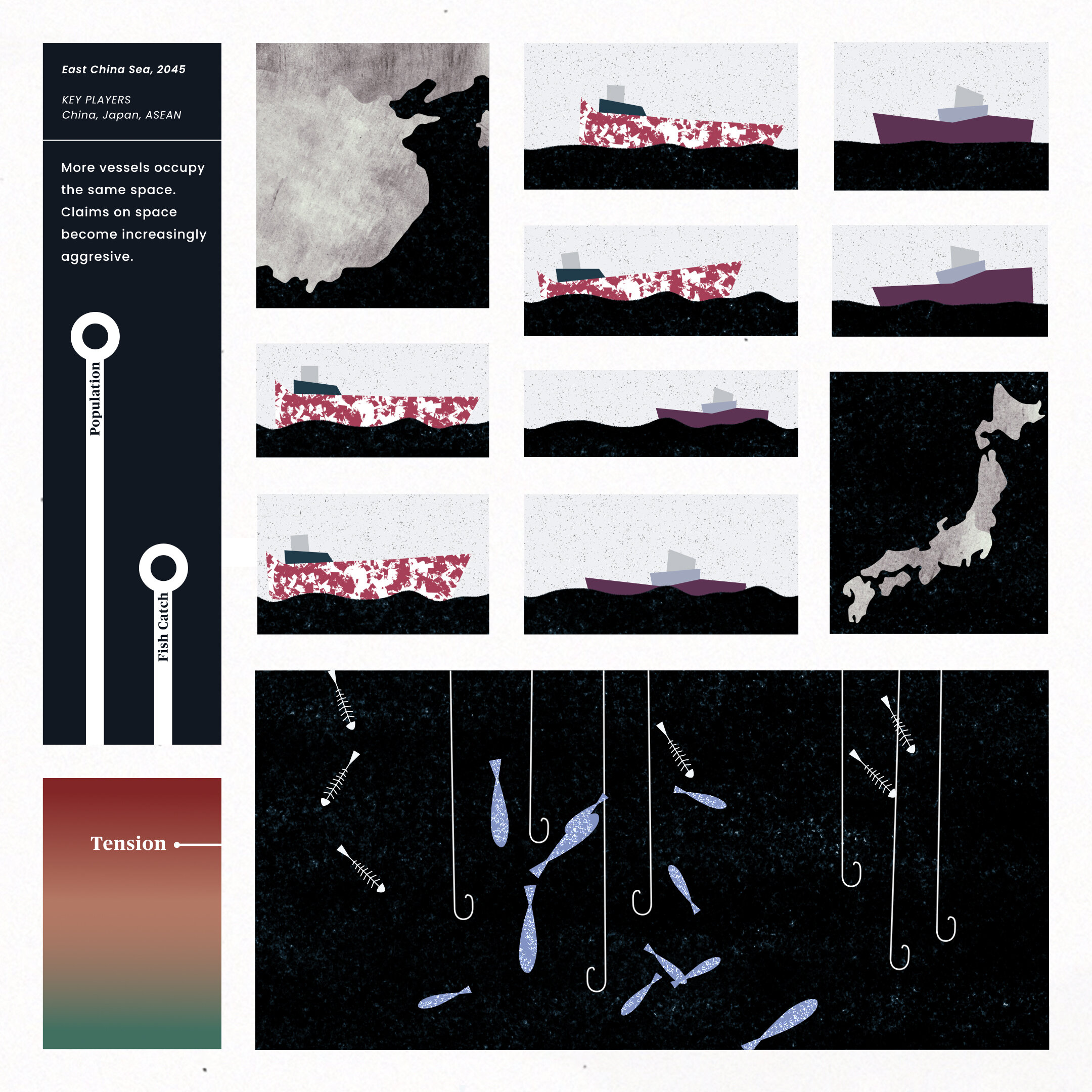Remodeled Empire - East China Sea (2045)
We are reading excerpts from a transcript of the meeting held at the UN headquarters in New York to address the East China Sea crisis. The objective of this meeting is to discuss ways forward and mobilize action in the international community through the United Nations in response to the escalating crisis spreading across the Pacific region. This crisis is the result of a series of flashpoints that have ratcheted up in the region, year by year, little by little. The excerpts provide a snapshot of the debate held between Security Council members, chaired by the Prime Minister of France. They feature the Prime Minister of Japan (via Videolink), the Foreign Minister of South Korea, the United States Secretary of State, the acting Chair of the Association of Southeast Asian Nations (ASEAN), the President of the European Council, the President of the Global Partnership for the Prevention of Armed Conflict (GPPAC), and the Permanent Representative to the UN of the People’s Republic of China.
EXCERPT 1 - Wednesday, 11:21 AM
President of GPPAC: Sehr geehrte Vorsitzende, vielen Dank für Ihre Einladung …
Interpreter: Madam chair, thank you for convening this meeting on the China Sea crisis. Excellencies, ladies and gentlemen, thank you all for joining us here today to participate in this crisis meeting. As President, I am speaking on behalf of the GPPAC Foundation, an international organization dedicated to advancing peace in the world and preventing conflict. Today, I have failed in that duty following China’s decision to veto the Security Ccouncil resolution to de-escalate the crisis in the region… We must rally together and by means of diplomacy prevent further escalation. Ensuring we can resolve the disputes will require Council members to take concrete action and display considerable political will in the face of a complex and rapidly evolving situation.
We can confirm that the start of this crisis, almost a month ago, was likely accidental. Video footage from U.S. low-flying surveillance drones show a Chinese nuclear-powered missile submarine, Jin Class, becoming entangled in the fishing nets of a Japanese trawler southwest of Uotsuri Island in the Senkaku Island chain. All crew lost their lives as the boat was dragged under. While no one was aware then of what had happened exactly, it is important to indicate that this collision was likely accidental.
Permanent representative from the PRC: Nǚshìmen xiānshēngmen…
Interpreter: Ladies and gentlemen, we appreciate the attention that is being paid to the unfortunate accident. To clarify, what is of course an unintentional omission from the President of GPPAC, we vetoed a resolution seeking further multilateral talks for de-escalation – we remain open to bilateral negotiations. Further, we express our concerns that certain rogue actors appear to consider the event something more than an unfortunate accident…
Prime Minister of Japan (via Videolink): Kore wa guuzen dewanai…
Interpreter: (struggling to catch up) With all due respect, we do not believe this was accidental. China has crafted a way to push forward their coordinated, long-planned operation to mobilize hundreds of fishing boats and a large naval force to advance on the Senkaku islands and East China Sea. This was clear even back in 1997 with their unwillingness to discuss this matter during the talks for the bilateral fisheries agreement. Likely the Paracel and Spratly islands in the South are next. They wanted us to retaliate, to give them an excuse to execute their strategy. Chinese fishing boats have had their fishing gear in the water, but for years now their nets and lines have been empty of fish in their own Exclusive Economic Zone. We have amassed enough evidence to show that their coastal and inland fisheries resources have been severely overfished and are in decline. Their fishing effort simply was, and is not, sustainable, nor is their rapidly growing domestic seafood consumption which now accounts for almost half of global consumption. So they come into our rich fishing grounds, into many other neighboring zones in fact, with an increasing number of boats, and illegally target our fish. It only has gotten worse throughout the last month.
Permanent representative from the PRC: Yǐ wǒmen de qiànyì…
Interpreter: With our apologies, but prior to being interrupted, we were expressing our regrets. We agree with the Japanese representative that the fisheries around China are depleted, owing in no small part to the voracious appetites of our neighbors Japan and Korea, as well as foreign interlopers. To ignore the history of aggression from foreign powers near and far would of course be quite foolish. However, many of these concerns are moot. We fish in our territory – the Diaoyu, Nansha, and Xisha islands – all of which China has actively developed for many decades. Do we question whether Japan can fish near Honshu or Okinawa? Of course not. Would we expect Indonesia to defend Java and Sumatra? Absolutely. China’s actions must be viewed in the same light as this regarding its territorial sovereignty.
Prime Minister of Japan (via Videolink): Genzai no jōkyō ni dōi shinai…
Interpreter: This duplicity is no surprise to us. We have felt for years how Chinese vessels aggressively pressed into our territories for our seafood, barely held accountable by their government. Their government welcomed it. Fishing vessels entering disputed zones only strengthened China’s maritime presence. China sees these fishing disputes through their nationalist lens, to pursue their own agenda for more resources, more territory! If they truly had not wanted this conflict at sea, they would have steered their fisheries policy away from boosting fisheries production long ago, avoiding what have now been years of fishing clashes at sea to escalate like this. Their attempts at dis-incentivizing their fishermen from expanding operations have been fruitless. A vessel buy-back program to reduce fishing pressure, but at the same time still not really lowering fuel subsidies? They never even monitored the actual performance of their policies and programs: vessel tonnage kept increasing, Chinese fishing effort is now at an all-time high. Besides, they also have their eye on prominent shipping routes and natural gas and oil reserves that surround our islands. To try and lay official claim to our marine resources they began extensive territorial remodeling, bringing into being dozens of square kilometres of new land. They do not seem to care about working within the bounds of international law as much now, ignoring the UNCLOS prohibition on the use of force.
Permanent representative from the PRC: Nǚshìmen xiānshēngmen…
Interpreter: Strange that you speak as though we are not here. And stranger yet to speak of ignoring international law when Japan has flouted the International Whaling Commission decisions for nearly a century. And let us not forget the devastation Japan visited upon the most valuable commercial fishery in the Pacific, relegating the Pacific Bluefin Tuna to a functionally extinct status. It seems that the cat weeps for the dead mouse – but we are not fooled by this false pretense of concern.
Prime Minister of Japan (via Videolink): (In an authoritative tone) This academic reflection of historic perceptions is devoid of meaning in light of present events. This incident was deliberate – China delivered a targeted threat. So yes, we sent in our Maritime Patrol Aircraft Kawasaki P-1 to track the Chinese submarine after it sunk our trawler. Our data clearly shows that the submarine was headed further into our territory. It was only once this data was available to us that we sent in our Shikishima vessel and its two helicopters. They were quickly met by two Chinese naval destroyers, sent from their nearby military station. We were left with no choice but to engage. Our vessel fired a warning shot over the bow of the Chinese destroyer, but the destroyer did not stop. It fired back, holing the coastguard cutter below the waterline and sinking our vessel and our men… Ladies and gentlemen, with all due respect, these are clear intimidation tactics threatening Japanese sovereignty.
Excerpt 2 - Wednesday, 19:48 PM
US Secretary of State:
Thank you, Chair. Well. I think this is a good time to clearly state our involvement: we do not take a position on ultimate sovereignty of the islands. But they are covered by the U.S.-Japan Security Treaty. With South Korea’s decision to not come to Japan’s aid and defense, we -
Foreign Minister of South Korea: Ulineun tongbodoeji anh-assda...
Interpreter: No intelligence has been shared with us. May I remind you of Japan’s actions undertaken against our country, starting decades ago? How can they expect us to come to their aid when they forced us to break the General Security of Military Information Agreement already in 2016? Not only that, this was followed by aggressive and unsafe behavior at sea, provoking and threatening us near the Yellow Sea. Not to mention their inability to apologize for their dogmatic behavior and occupation decades ago during -
Chair:
Please, Foreign Minister! Let us remain focused on the current situation here. United States Secretary of State, you have the floor.
US Secretary of State:
Thank you, Chair. This is not a critique of South Korea. We are well aware of the long-standing tensions in the region, which structure foreign security policy. However, the last two weeks were chaos. The aggressive seizure of numerous Japanese fishing vessels; last week the sinking of a Japanese Defence forces vessel and three Chinese coastal patrol boats; the sinking of multiple fishing vessels on both sides; the illegal detention of Japanese, Vietnamese and Chinese citizens; the destruction of an offshore oil installation that was a U.S.-Japanese joint venture and which is now spilling oil into the Pacific Ocean… Our U.S. Pacific Fleet Carrier Battle Group is still in a stand-off with a large Chinese naval contingent as we speak. Fortunately, as of yet, no shots have been fired (pauses).
We are looking at more than 200 deaths in the region, primarily Japanese Coast Guard and Self Defense forces. China was clear in its message to us all this morning: it vetoed a Security Council Resolution calling for rapid de-escalation, refusing to engage in multilateral talks. China seems to view this situation as an infringement of their sovereignty and will stand down only once they feel the issue has been adequately addressed through bilateral talks with individual countries in the region. With this in mind, the United States is reassessing its will and responsibility to engage in this conflict.
Permanent representative from the PRC: Wǒmen gǎnxiè měiguó…
Interpreter: We thank the US representative for their recognition of Chinese sovereignty in these matters. Further, we appreciate the US re-emphasis on bilateral talks. Multi-lateral negotiations are so often derailed by tedious posturing – by tiresome bickering. Indeed we need look no further than the peacocks parading before us today.
(Angry mumbling coming from the Japanese VideoLink)
Excerpt 3 Thursday, 03:19 AM
President of the European Council:
A short statement only, thank you Chair. We, as the EC, do not take any position on the sovereignty of the territories. However, we wish to stress the importance of multilateralism and of the rule of law. We urge the parties involved to cease any use of force and to not threaten Beijing any further. We must de-escalate this crisis using all non-violent policy means at our disposal. Moving out of the region temporarily will facilitate the reverting to a status-quo, and then the parties can seek external assistance in the form of mediation or arbitration, in a transparent manner.
Acting Chair of ASEAN: Kami menolak cadangan yang disyorkan oleh kesatuan Eropah …
Interpreter: ASEAN rejects the path laid out by the EU. Let me first thank the United States for being the first responder and attempting to contain the aggression as quickly as they did. We failed to get intra-bloc consensus within ASEAN, so we are only now ready to move forward with a few… proactive ASEAN states. So, ASEAN has invoked ‘ASEAN minus X’ from Article 21 of our Charter in this crisis. Taiwan, Singapore and Thailand have decided to remain neutral in this political crisis (nervous shuffling of papers). In any case… For many years now we have tried to peacefully deal with our own fishing clashes, watching as Chinese vessels moved in, looking to fill their boats with giant clams, sea turtles, fish that is ours, simply because their waters are polluted and nearly empty. Close to 80 percent of their fish stocks are overexploited or collapsed, they barely have feed-grade fish left to catch. We acknowledge some of the efforts China has made in reducing exploitative and illegal behavior, but agree with Japan that the measures undertaken so far are weak and only occasionally enforced. A closer look at the satellite imagery around, say, Subi and Mischief Reef shows how Chinese navy-trained fishing militia vessels have simply invaded the South China Sea. This persistent militia presence and their aggressive tactics are clear threats to our sovereignty.
Permanent representative from the PRC: Zhōngguó chéngrèn ASEAN de kànfǎ…
Interpreter: We acknowledge ASEAN’s perception of this issue, yet we do not recognize this criticism as legitimate. Too often in this group, the collective memory of past actions is conveniently brief, especially on the part of Western nations and their rapacious ambition. China represents the largest population in East Asia, and as such we will do whatever we deem necessary to feed our people. Moreover, we are the world’s most powerful economy, producing and consuming more than any other nation. We welcome other nations to our table, and we welcome friendships that acknowledge the benefits of harmonious cooperation with Chinese interests. However, we categorically reject the demand to compromise our sovereignty in any of these matters. Calls to do so will be ignored.
Acting Chair of ASEAN: Kami menolak cadangan yang disyorkan oleh kesatuan Eropah …
Interpreter: Regretfully this reaction is entirely predictable. History has shown that the tools we use - soft power and international law - are simply not successful in these sorts of disputes. ASEAN has tried too many times. You may recall that we came close to ratifying a Code of Conduct for the South China Sea with China, but Beijing always challenged its binding status and continued to initiate attempts at bilateral talks, undermining the progress we had made as a unified group of nations. With this rapid escalation in the East, the Code will be neglected completely. Moreover, from investigations of a whale carcass stranded at Ha Tinh beach, we have intelligence that the Chinese Type 815 spy ship is possibly connected to a network of chipped marine mammals used by the Chinese government as undetectable underwater surveillance of the South China Sea. This is a blatant violation of our maritime security cooperation agreement. So, with all due respect, with China now having vetoed a peaceful resolution, we have exhausted all diplomatic means to address the crisis and military force is the only way to address the current situation. ASEAN minus X have decided to proactively protect our resources, our territories. Malaysia and Indonesia are preparing a concerted, collective approach to combat Chinese aggression. Their Navies are preparing to assist Japanese and US forces by all means necessary as we speak.
Silence falls over the meeting…
ALternative pathway(s)
China takes renewed control over its fisheries sector, reducing the amount of overfishing and fishing vessel incursions from Chinese actors. China’s marine sector would shrink due to reduced landings, effectively following in the footsteps of Japan, South Korea and Taiwan. This paradigm shift in the country’s food security strategy (this is: letting go of the idea of self-sufficiency in fish supplies) would occur through several policy changes. China effectively executes on its plans to cull down its fishing fleet and total catches over the next years, partially through setting and enacting tougher penalties on illegal fishing, the poaching of endangered species and marine pollution. The labor force within wild-capture fisheries would continue to shrink, and China would heavily invest money in tackling issues associated with aquaculture, boosting the sector.



